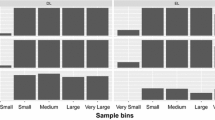Abstract
Conducting experimental analysis on rule reasoners is a mainstream task for validating novel algorithms and systems. Nevertheless, providing robust, verifiable, and reproducible experiments can still raise a sensible challenge. This paper introduces B-Runner, an open library for collaborative benchmarking focusing on the deployment of extended tests for knowledge and rule-based systems with low cost and high robustness. B-Runner reduces the benchmarking setup time while guaranteeing experiment repeatability. Also, it improves the scrutability of experimental protocols thereby enhancing the fairness of system comparisons.
Access this chapter
Tax calculation will be finalised at checkout
Purchases are for personal use only
Similar content being viewed by others
Notes
- 1.
reproducibility is stricter than repeatability: not only it ensures that the experiment can be re-run, but that it also yields the same result.
- 2.
To illustrate, consider the factbase \(F=\{P(a)\}\), the rule \(\forall x. P(x)\rightarrow R(x)\), and the boolean query \(Q=\exists y. R(y)\). The chase yields \(\{ P(a) , R(a) \}\) where Q answers true. Query rewriting yields reformulation \(\exists y. R(y)\vee P(y)\) answering true on F.
- 3.
typical errors are including/omitting optimizations and/or parsing time, writing on disk or standard output (logging, result export), improper cold/warm measures [14].
- 4.
To illustrate, lines 6–8 of Fig. 2 can be written in JSON as the record {scenario: {s10M: {data:data10.dlgp, rule:ontology.dlgp, workload:queries.dlgp}}}.
- 5.
In the example, the .dlgp extension stands for the Datalog-Plus language [4].
References
B-runner repository (2024). https://gitlab.inria.fr/rules/brunner
Angele, K., Angele, J., Simsek, U., Fensel, D.: RUBEN: a rule engine benchmarking framework. In: Rule Challenge @ RuleML+RR 2022 (2022)
Baget, J.F., et al.: InteGraal: a tool for data-integration and reasoning on heterogeneous and federated sources. In: BDA 2023. Montpellier, France (2023)
Baget, J., Gutierrez, A., Leclère, M., Mugnier, M., Rocher, S., Sipieter, C.: Datalog+: formats and translations for existential rules. In: RuleML (2015)
Barker, A., van Hemert, J.: Scientific workflow: a survey and research directions. In: Wyrzykowski, R., Dongarra, J., Karczewski, K., Wasniewski, J. (eds.) PPAM 2007. LNCS, vol. 4967, pp. 746–753. Springer, Heidelberg (2008). https://doi.org/10.1007/978-3-540-68111-3_78
Beeri, C., Vardi, M.Y.: A proof procedure for data dependencies. J. ACM (1984)
Benedikt, M., et al.: Benchmarking the chase. In: PODS (2017)
Cohen-Boulakia, S., et al.: Scientific workflows for computational reproducibility in the life sciences: status, challenges and opportunities. Futur. Gener. Comput. Syst. 75, 284–298 (2017)
König, M., Leclère, M., Mugnier, M., Thomazo, M.: Sound, complete and minimal UCQ-rewriting for existential rules. Semantic Web 6(5), 451–475 (2015)
Lenzerini, M.: Data integration: a theoretical perspective. In: PODS (2002)
Liang, S., Fodor, P., Wan, H., Kifer, M.: Openrulebench: an analysis of the performance of rule engines. In: WWW (2009)
Liew, C.S., Atkinson, M.P., Galea, M., Ang, T.F., Martin, P., Hemert, J.I.V.: Scientific workflows: moving across paradigms. ACM Comput. Surv. (2016)
Liu, J., Lu, S., Che, D.: A survey of modern scientific workflow scheduling algorithms and systems in the era of big data. In: 2020 IEEE International Conference on Services Computing (SCC), pp. 132–141. IEEE (2020)
Manegold, S., Manolescu, I.: Performance evaluation in database research: principles and experience. In: EDBT (2009)
Mugnier, M., Thomazo, M.: An introduction to ontology-based query answering with existential rules. In: RR Summer School (2014)
Author information
Authors and Affiliations
Corresponding author
Editor information
Editors and Affiliations
Rights and permissions
Copyright information
© 2024 The Author(s), under exclusive license to Springer Nature Switzerland AG
About this paper
Cite this paper
Ulliana, F., Bisquert, P., Charoensit, A., Colin, R., Tornil, F., Yeche, Q. (2024). Collaborative Benchmarking Rule-Reasoners with B-Runner. In: Kirrane, S., Šimkus, M., Soylu, A., Roman, D. (eds) Rules and Reasoning. RuleML+RR 2024. Lecture Notes in Computer Science, vol 15183. Springer, Cham. https://doi.org/10.1007/978-3-031-72407-7_3
Download citation
DOI: https://doi.org/10.1007/978-3-031-72407-7_3
Published:
Publisher Name: Springer, Cham
Print ISBN: 978-3-031-72406-0
Online ISBN: 978-3-031-72407-7
eBook Packages: Computer ScienceComputer Science (R0)




